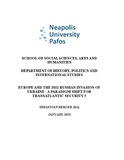| dc.contributor.advisor | Fakiolas, Efstathios T. | |
| dc.contributor.author | Berger, Sebastian | |
| dc.date.accessioned | 2023-04-24T10:40:44Z | |
| dc.date.available | 2023-04-24T10:40:44Z | |
| dc.date.issued | 2023-01 | |
| dc.identifier.uri | http://hdl.handle.net/11728/12401 | |
| dc.description.abstract | Russia’s 2022 invasion of Ukraine has uprooted the fundamental principles of the transatlantic
security order and forced the transatlantic community and its institutions into collective action.
Vladimir Putin’s blatant disregard for the territorial integrity and national sovereignty of Ukraine
has prompted a need to re-assess the state of Europe’s security architecture, transatlantic security
arrangements and the role of the North Atlantic Treaty Organization (NATO) in guaranteeing
peace and stability in the transatlantic region. This dissertation focuses on exploring the
transatlantic community's response to the 2022 Russian invasion of Ukraine by analyzing the
historic and geopolitical context as well as the implemented measures and posture changes of its
key institutions; NATO and the European Union (EU). The argument set forth underlines the
significance of the events we currently see unfolding in Ukraine, with both NATO and the EU
acting decisively under a remarkable degree of cohesion and unity to confront the Russian threat.
Security and defense are back at the heart of the political discourse and agenda, leading to
monumental policy changes in many European countries and the reinvigoration of NATO’s
importance in safeguarding the security of its member states. Over the course of the first two
chapters, this thesis provides a solid theoretical and historical foundation of the most important
milestones and building blocks crucial to the transatlantic security order as well as Russia’s
relationship with the transatlantic community and its institutions. It utilizes a broad range of
primary sources contrasted with a substantial amount of scholarly work originating in the
disciplines of international relations, political science and international law. The subsequent
chapter thoroughly examines the NATO response to the 2022 Russian invasion of Ukraine,
performing a structured analysis of key policy documents such as the 2022 NATO Strategic
Concept and relevant summit declarations preceding the Madrid gathering. The pool of data was
furthermore extended by a semi-structured expert interview with an official of NATO’s
public-diplomacy division based in the Brussels headquarters. | en_UK |
| dc.language.iso | en | en_UK |
| dc.publisher | Master in International Relations, Strategy and Security, School of Social Sciences, Arts and Humanities, Neapolis University of Pafos | en_UK |
| dc.rights | Απαγορεύεται η δημοσίευση ή αναπαραγωγή, ηλεκτρονική ή άλλη χωρίς τη γραπτή συγκατάθεση του δημιουργού και κάτοχου των πνευματικών δικαιωμάτων | en_UK |
| dc.subject | Transatlantic Security | en_UK |
| dc.subject | European Security | en_UK |
| dc.subject | Russia | en_UK |
| dc.subject | Ukraine | en_UK |
| dc.subject | NATO | en_UK |
| dc.subject | EU | en_UK |
| dc.title | Europe and the 2022 Russian Invasion of Ukraine - A paradigm shift for Transatlantic Security? | en_UK |
| dc.title.alternative | This thesis was submitted for distance acquisition of a postgraduate degree in International Relations, Strategy and Security at Neapolis University | en_UK |

